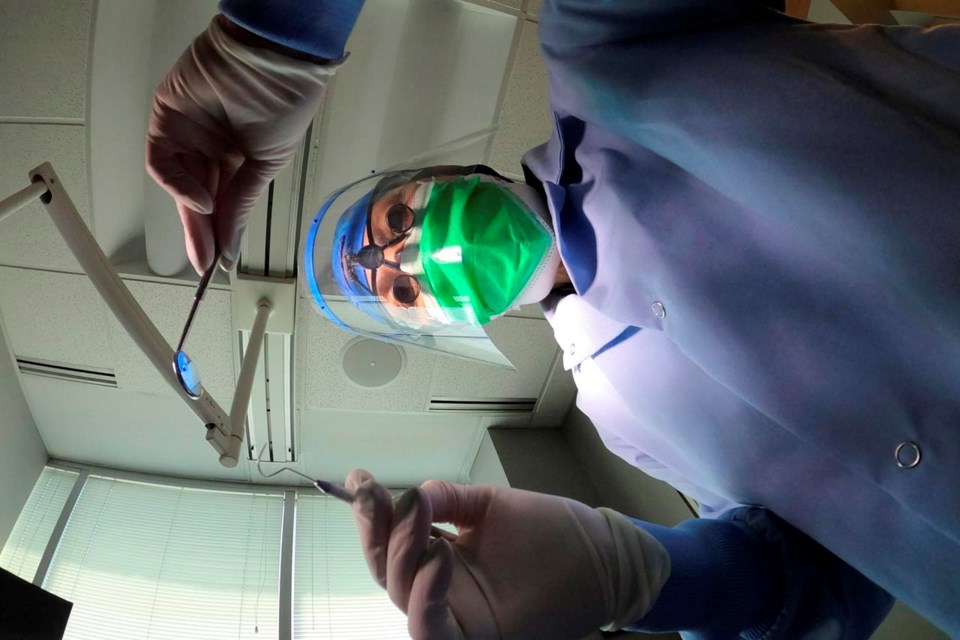OTTAWA — The federal government unveiled some details Monday of a long-awaited plan to help uninsured Canadians afford dental care — a rollout industry professionals say they'll be watching closely for its impact on staff shortages and private coverage.
Seniors over the age of 87 will be the first cohort invited to apply to join the federally subsidized dental plan as Ottawa gradually enrols eligible participants over the course of the coming 12 months.
The program — currently projected to cost $13 billion over the next five years — will be slowly expanded over the next year to include all qualifying seniors, children under the age of 18 and people with disabilities.
The first group of seniors to join the program won't be able to start making claims for their dental visits until May, though the exact coverage date will vary from person to person.
The federally funded insurance program, which was developed with the New Democrats, is aimed at people with an annual household income under $90,000 who don't have access to private insurance.
Families that make less than $70,000 won't have copays on their dental services. Others will have copays that total somewhere between 40 and 60 per cent of the total cost of services, depending on their family income.
"Far too many people have avoided getting the care that they need simply because it was too expensive, and that's why this plan is essential," Health Minister Mark Holland told a news conference.
There has been "enormous additional cost" to the health system — to say nothing of a person's own dignity — when people have to wait until their oral health is so dire that they have to get treatment at the emergency room, Holland said.
"We know we can do better."
Details of the exact services to be covered haven't yet been released, but they will include preventive, diagnostic, restorative and surgical services — including X-rays, fillings, root canal treatments and dentures, among others, he said.
Nor have the governing Liberals released details of how much dental-care providers will be reimbursed for specific services, making it difficult to assess how much participants will be expected to pay out of pocket.
The government estimates as many as nine million Canadians lack private coverage.
Once the eligibility is expanded to all qualifying Canadian residents in 2025, the plan will be the largest public benefit program in the country's history, said Citizens Services Minister Terry Beech.
The Canadian Dental Association, which has long called for improved access to dental care for low-income and vulnerable Canadian residents, welcomed word of the rollout.
Association president Dr. Heather Carr said she believes thousands of dental clinics will have to step up to accommodate the potential influx of new patients.
In its last federal budget, the government pledged to put $250 million toward making dental-care services more accessible over three years, starting in 2025.
"We do have staff shortages, as in every health-care sector. So what I'm hoping is that part of the oral health care access fund will work toward addressing some of those issues," Carr said.
The government has largely brushed off concerns raised by dental professionals early in the planning process about the potential for employers and provinces to reduce or eliminate their plans, and instead refer people to the federal program.
"Two-thirds of Canadians have access to first-class dental care that we do not want to see disappear," said Dr. Brock Nicolucci, president of the Ontario Dental Association.
"If it does start disappearing, that $13 billion that's been allocated over the five years could start ballooning."
Holland said he's in talks with the insurance industry, provinces and businesses about maintaining their current coverage.
"It's so important to state that the objective here today is to fill in the gaps to make sure that people who don't have access to care get care," Holland said.
"We're certainly working with industry and with insurance companies to make sure that that's the case."
The insurance plan is a key pillar in the Liberal's supply-and-confidence deal with the New Democrats to secure the opposition party's support on key votes.
The NDP lauded the news in a statement Monday, styling the plan as "the NDP national dental care program."
Liberal ministers also shared the credit with NDP health critic Don Davies at Monday's news conference, lauding his role in developing and advocating for the program.
"By working in co-operative partnership with our Liberal colleagues, New Democrats have helped secure dental care for nine million Canadians," Davies said.
"It's no exaggeration to say that this is the biggest expansion of public health care in Canada in many generations."
The Conservatives did not respond for a request for comment on the program or its anticipated rollout.
The government is expected to start mailing out letters to qualifying seniors this week to invite them to apply for the program. Once they get the letter, they will be able to connect with a government call centre to learn more and get the enrolment process started.
"There is no proactive action that any Canadian needs to take today in order to enrol, other than making sure that you're up to date and filing your taxes," Beech said.
The tax filings will help the government determine if they meet the income requirements and whether people have insurance through their employers.
In May, the government plants to launch a web portal for people who wish to enrol.
This report by The Canadian Press was first published Dec. 11, 2023.
Laura Osman, The Canadian Press



